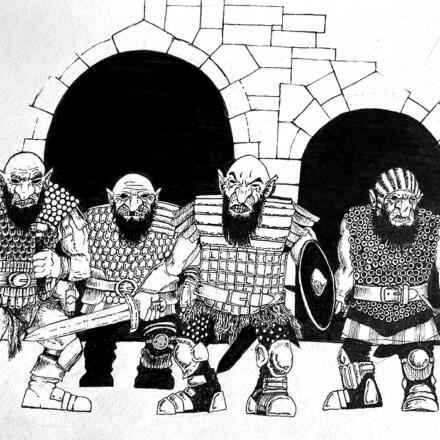Confidence is a key requirement for any good GM. Even if you don’t know the rules backwards and forwards, a certainty in your skill at running and crafting a game is often good enough to give the players a great experience. A large part of the journey in even becoming a GM is in just having the fortitude to try. So how could confidence possibly be a bad thing in a GM? When confidence crosses the line into megalomania.
Okay, so maybe calling it megalomania is a little dramatic, but I’m sure everyone reading this has run into a GM that was arrogant enough to believe their game was the best thing out there and couldn’t be told otherwise. Megalomaniacal GMs come in different flavors, but they’re all problematic eventually. When you stop thinking you can improve your game, you’ve fallen into the arrogance trap.
The first type of GM that falls into this trap is generally the easiest to avoid. I’ve always been wary of GMs that insist they don’t like to play and only want to run games. Hearing that statement has almost always been followed by a really awful game. For these GMs, their arrogance has very little to do with any actual skill, or even a love of the game. These folks are running games simply for the sense of control it gives them. As has been discussed before, good GMs need to play now and again to refresh their insight on how to run games and to remember what it’s like to be on the player’s side of the table. Those that refuse to play are usually unconcerned with the player’s experience.
This is not to say that good GMs can’t prefer to run over play. Really good GMs find joy in creating their worlds and providing players with an amazing time, but they also know the value of sitting back and relaxing into playing a single character for the night, or even in being a player for a new GM learning the ropes. Knowing both sides of the table makes for better GMs and better players.
Now you’re wondering if maybe you’ve fallen into this trap. Well, even asking yourself a question like that is a sign you’re probably okay, but if you’re really not sure, ask yourself these two questions:
Have players stopped giving you feedback? At the end of a session, when a GM asks, “How was it?” most honestly want to know what the players think. Finding out what the players liked and didn’t like is the best way to figure out how to improve your skills and run even better games. Players that offer good feedback that is either ignored or brushed aside will eventually stop offering their opinions. Why keep talking to an over-confident brick wall that isn’t going to change anything anyway?
If, at the end of the session, your players have nothing good or bad to say, start rephrasing the question. Change the wording to make it more open ended or reaffirm the idea that you really do want their opinions and not just their adulation. Some groups take a two-pronged ‘liked most, liked least’ approach, giving players a way to say something good along with something bad. Regardless of what method you take, make sure you listen to your players.
Have some of your best players stopped showing up? Eventually, when the arrogance gets to be too much, players will find something better to do with their time. When many of your regular, good players stop coming and the excuses seem flimsy, it’s probably time to take a step back and try and figure out why the game wasn’t fun for them any longer. Yes, life happens and interests change, but the surest sign that you might have a problem with your confidence turning into arrogance is when players stop wanting to play in your games.
One major problem here, though, is that many of these GMs won’t see the issue because they’re good enough that new players fall into the void left by other players. I’ve known GMs who run a good game the first few times you play, but then the problems start becoming grating. Eventually the old, good players they once had find other things to do, but the new players are still riding the high from the first couple of games.
Do you have a regular turnover in your player base? If you have a new group of players every year, it might be a good time to take a step back and reexamine what you’re doing.
Ultimately, confidence is key, but nobody is so good that there’s nothing left to improve upon.


















I seldom do this, and I should be better at it, but I wanted to say that this was a great article. It also gave depth to your other articles by linking them to this one.
A suggestion I can give is to go to conventions or smaller gatherings to pick up new ways of game mastering to break your own habits. Nothing wrong with habits, but they can get old after a while.
Yes, seeing how other GMs do things often gives me insight–or a cool trick I can borrow for my own table.
I sometimes worry that I’m the second type.
Definitely think I’m falling into the latter after reading this. Now how to fix it? How does one get their groove back?
Attend a con and play–but pay careful attention to what the GM is doing. (I mean, yes, enjoy yourself as a player–that’s important to help recharging your batteries.) Try to take away at least one thing from each game you play in–a way to handle initiative, the use of picture printouts, music, or whatever it is that worked for that GM. Then incorporate those elements into your own game. Now that you’re looking for things to improve, and making changes, you’re more receptive to them.
Alternately, approach your prep differently next time. If you’re great at building areas to explore, try a character focused session. (Martin’s Spotlight Moments is a good guide.) If your sessions have been open sandboxes, try a tightly plotted session to turn the pressure up–and change the feel of the session altogether.
You may be wrong altogether; as Angela mentioned, if you’re wondering, you’re probably on the good side. Asking your players is tricky, but we’ve tackled getting feedback (and affirmation) in a few articles.
If you’re really concerned and want to tackle it yourself, instead of asking your players, you can take Phil’s performance review.
Good luck!
It sounds cliche, but acknowledging there might be a problem is the first step. I’d talk with some of your best players, especially if they’ve shown less interest in your games, and find out what’s missing from their perspective. Even just stepping back and playing for a bit while someone else runs may be enough to revive your mojo.
Another thing people should do is run different systems/scenarios. Get something outside your confort zone, it will force to try hard to make it enjoyable for the players, instead of just going with your natural flow.
You make awesome dungeon crawls? Try some horror games. Your space operas are usually epic tales of battle and heroism? Try running a conspiracy/social game.
Yes, it might suck sometimes, but you might also find out some other genre you and your players like. At the very least, it will get you working and trying to be a good GM.
That’s an excellent suggestion.
agreed, some of my best moments have come from cross genre fertilisation
I had a GM once who handed out half sheets of paper after each session and asked everyone to answer a few questions for bonus xp. One of them, which he was sure to tell us *every time* that no one ever filled out, was ways he could improve. Since there were lots of ways that he could improve, I made sure to always fill out that question.
Few weeks later and that question was no longer in the rotation because “No one was putting anything down”. So of course I kept writing it in and filling it out. After all, apparently he had missed everything I wrote prior weeks.
Few more weeks and the end of game questionnaire disappeared entirely because “Everyone mostly left theirs blank.” I made sure to tear a half sheet off my scrap paper and give him some constructive criticism, but the withering glare he gave me made it clear(er) that it wasn’t really necessary.
Heh. He probably didn’t really want the constructive criticism so much as the undying adulation of his players. The feedback sheet is a neat idea, but only if he was willing to actually listen. I highly doubt the other players left it blank too. 🙂
good article; I have been using an online forum to ask for feedback, and its had some success, but not with everyone in the group. It can take a fair amount of pushing to get most players to give honest feedback I find.
I like the idea of ‘tell me one thing that was good, and one thing that could be better’ I will use that after the next session i run (which i hope wont be for a while as I am currently enjoying being a player 🙂 )
I always ask the players how it’s going, what they liked, where they thought it should go, then often crafted my next moves around the feedback.